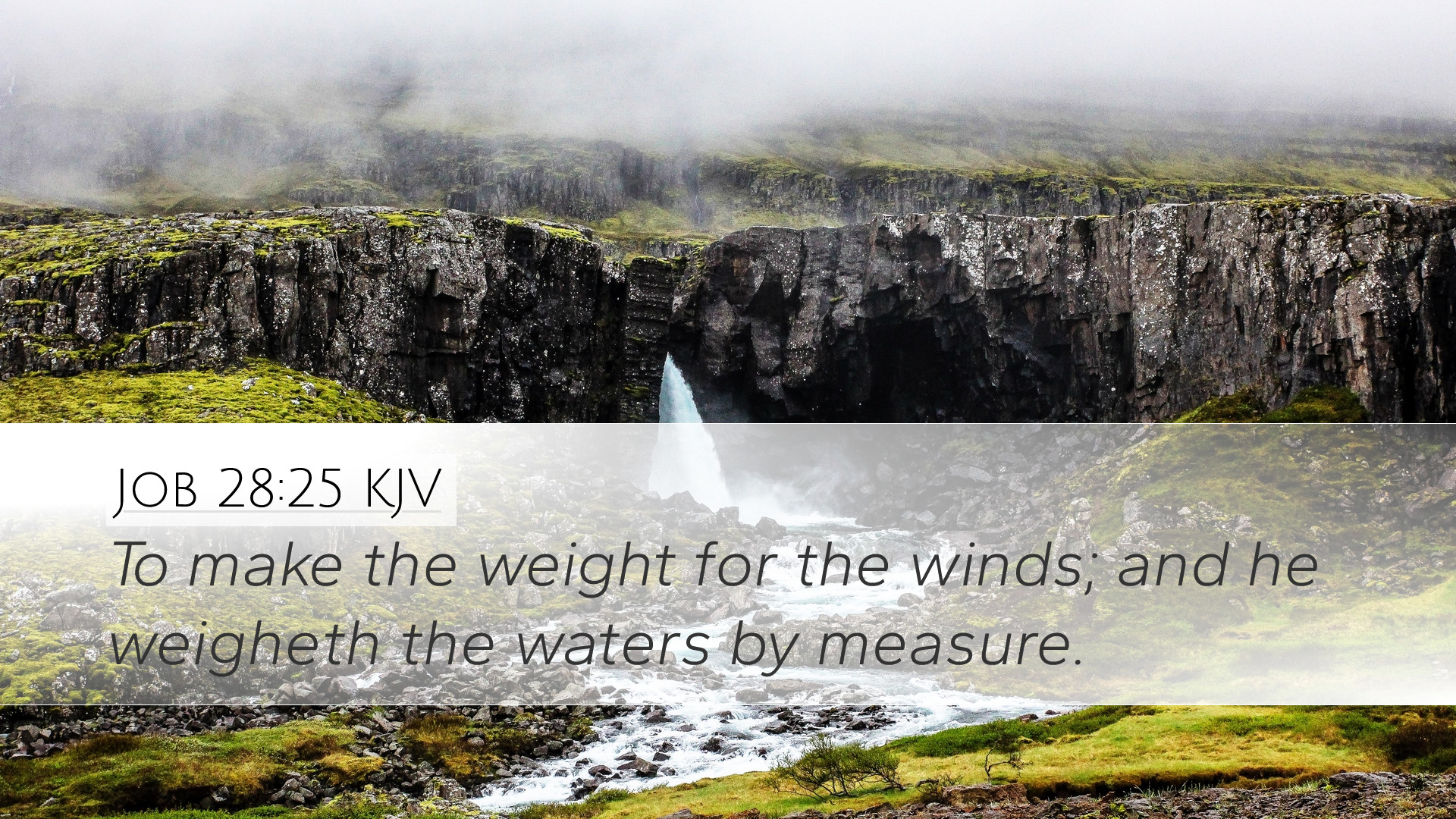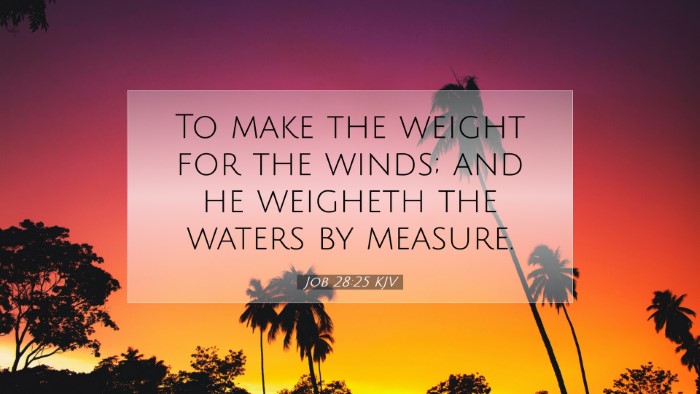Old Testament
Genesis Exodus Leviticus Numbers Deuteronomy Joshua Judges Ruth 1 Samuel 2 Samuel 1 Kings 2 Kings 1 Chronicles 2 Chronicles Ezra Nehemiah Esther Job Psalms Proverbs Ecclesiastes Song of Solomon Isaiah Jeremiah Lamentations Ezekiel Daniel Hosea Joel Amos Obadiah Jonah Micah Nahum Habakkuk Zephaniah Haggai Zechariah MalachiJob 28:25
Job 28:25 KJV
To make the weight for the winds; and he weigheth the waters by measure.
Job 28:25 Bible Commentary
Commentary on Job 28:25
Verse: “To make the weight for the winds; and he weigheth the waters by measure.” (Job 28:25)
Introduction
The verse of Job 28:25 stands as a profound reflection on the wisdom and sovereignty of God in creation. It presents a metaphorical insight into divine control over natural elements, illustrating a deep theological truth consistent with the themes found throughout the Book of Job. This commentary will explore various insights drawn from the works of public domain scholars such as Matthew Henry, Albert Barnes, and Adam Clarke.
Contextual Understanding
Before delving into the verse itself, it is crucial to understand the broader context of Job 28. This chapter is often referred to as the 'hymn of wisdom', where Job reflects on the inaccessibility of wisdom and its divine origins. The imagery of mining for precious metals serves to symbolize the search for wisdom—a task far more challenging than identifying material riches.
Insights on Job 28:25
The Weight of the Winds
Matthew Henry interprets the phrase “to make the weight for the winds” as a description of God's omnipotence in regulating the forces of nature. This idea suggests that each gust of wind is subject to divine order, emphasizing God’s authority over creation. Wind, often viewed as a chaotic force, is here depicted as having weight, signifying that nothing occurs without God’s permission.
The Measurement of Waters
Albert Barnes expands on the next part of the verse, “and he weigheth the waters by measure.” He notes that this emphasizes God’s meticulous control over vast bodies of water, perhaps alluding to His sovereignty over storms and seas. The imagery of weighing implies precision and intentionality in God’s governance—a comforting idea suggesting that the Lord cares for His creation and exercises control over potential chaos.
Theological Implications
Both aspects of the verse reinforce the theological theme that God's wisdom exceeds human understanding. Adam Clarke elucidates that God's ability to manage and weigh the winds and waters serves as a metaphor for His infinite wisdom and the structuring of natural laws. Humans may seek wisdom in their own pursuits, but it is only found fully in recognition of God’s governance of the universe.
Application for Believers
This verse, when applied to the lives of believers, encourages reliance upon God’s wisdom amid life’s uncertainties. The understanding that God weighs the winds implies that He knows the trials faced by His people and measures their burdens. The assurance of God’s providential control should provide strength and peace to pastors, students, and scholars as they navigate their spiritual and academic journeys.
Conclusion
Job 28:25 stands as a testament to the majestic wisdom and power of God in creation, reminding the faithful of His sovereign authority. As believers seek wisdom, they are drawn back to the reality that it is rooted in God's nature, reinforcing the need for humility and the acknowledgment of divine providence in every aspect of life.
Further Reflections
As you meditate on this verse, consider the following points:
- God's Sovereignty: How do you see God's sovereignty manifest in your own life and in the world around you?
- The Nature of Wisdom: In what ways can you seek wisdom that aligns with the understanding of God’s mastery over creation?
- Trust in God: How can you cultivate a deeper trust in God's plans when faced with life's uncertainties?


